National Health Amendment Bill by Dr. Susan Thembekwayo
Dr. Susan Thembekwayo of EFF introduced the National Health Amendment Bill to ensure public clinics provide 24/7 services, aligning with constitutional rights to healthcare access. The bill aims to amend the National Health Act of 2003, emphasizing the importance of dignity, life, and quality healthcare for all South Africans, especially the majority relying on public healthcare services.
- National Health Amendment Bill
- Dr. Susan Thembekwayo
- Public Healthcare
- South Africa
- Constitutional Rights
Download Presentation

Please find below an Image/Link to download the presentation.
The content on the website is provided AS IS for your information and personal use only. It may not be sold, licensed, or shared on other websites without obtaining consent from the author. Download presentation by click this link. If you encounter any issues during the download, it is possible that the publisher has removed the file from their server.
E N D
Presentation Transcript
NATIONAL HEALTH AMENDMENT BILL A PRIVATE MEMBERS BILL BY DR SUSAN THEMBEKWAYO (EFF) TO THE PORTFOLIO COMMITTEE ON HEALTH 07 OCTOBER 2020
The National Health Amendment Bill Chairperson and members of the Portfolio Committee on Health, the Economic Freedom Fighters hereby introduces the National Health Amendment Bill for deliberations by the Committee. The Bill seeks to amend the National Health Act of 2003(Act No. 61 of 2003) in order to provide that clinics in the public sector must operate and provide health services 24 hours a day and seven days a week. In its current format, Section 4 (3) of the National Health Act makes provisions for the kind of services clinics and community health centres must provide, but this does not include operating hours.
THE CONSTITUTIONAL CONTEXT Section 7 of the Constitution affirms the Bill of Rights as the cornerstone of our democracy, and that it enshrines the rights of all in our country. It also enjoins the State to respect, protect, promote and fulfil these rights. Section 10 of the Constitution states that everyone has inherent dignity and the right to have their dignity respected and protected Section 11 of the Constitution provides for a very important right for everyone in this country, the right to life. More importantly, Section 27 (1)(a) of the Constitution affirms that everyone has the right to have access to healthcare services, including reproductive healthcare.
THE CONSTITUTIONAL CONTEXT: CONT Section 27(2) of the Constitution provides that, The state must take reasonable legislative and other measures, within its available resources, to achieve the progressive realisation of each of these rights . The legislative measure as envisioned by the Constitution is the National Health Act, passed into law in 2003. It is the provision of this law that we seek to amend, in order to have a more tighter enforcement of the constitutional provisions to dignity, to life, and to quality healthcare.
The State of healthcare in South Africa South Africa has a bifurcated healthcare system, split between the private and public healthcare sectors. Over 82% of the population do not have medical aid insurance, and are therefore dependent on public health care. Only 18% have medical aid, and can afford to go to private health institutions whenever they have medical complications. This means that 82 out of every 100 South Africans depend on public healthcare. This translates to about 45 million South Africans. There are 422 hospitals, opened for 24 hours a day, catering for a variety of health needs of the citizens of this country.
State of Clinics in South Africa By 2018, there were 3 841 clinics and community health centres in the country, come of these came with community-based services such as environmental health services, school health teams and community health workers. Of these, 3 477 are fixed Primary Health Care (clinics) facilities, and are opened for only a prescribed period of time per day. These clinics are increasingly providing critical health services to the people, and there is a growing demand for their services. In the 2015/16 financial year alone, over 127 million clinic consultations were provided, and more than 3.4 million patients on antiretroviral therapy got their help from clinics and Community Health Centres. This includes support given to pregnant women, to the injured, the elderly, etc
So, what is the problem Clinics normally open between 07h00 and 16h00 from Monday to Friday. While this is generally the norm, there are exceptions to this. The City of Johannesburg in 2017 extended operating hours for the clinics their control to 18h00, and in 2018, adopted a resolution to open their clinics for 24 hours a day. The limited operating hours for clinics severely constrain access to critical primary health care. It infringes on the rights of citizens to have access to healthcare as and when needed.
What is the problem: Continued Health service challenges are not limited to specific time periods and can afflict a person at any time of day or night. Millions of South Africans are denied their right to have access to health services as enshrined in the Bill of Rights because an insufficient number of health facilities are open after hours, thus denying these South Africans access to health facilities should they fall sick or become injured after hours. People do not only get sick or suffer injury during the day when clinics are open. Many South Africans live too far from hospitals and are therefore unable to access healthcare establishments all the time. Clinics are in most instances the most effective and accessible healthcare provision centers.
Purpose of the Amendment The National Health Amendment Bill seeks to correct the problems identified above. It aims to bring the National Health Act closer to the aims and objects of the Constitution, as stated previously, by making access to healthcare facilities possible for twenty four hours a day, seven days a week. If passed, the Bill will radically change the nature of healthcare provision in the country, by making clinics, the first contact centre for millions of people, available for healthcare provision all the time.
Proposed Amendment The Bill seeks to amend Section 4 of the National Health Act of 2003, by adding a further subsection, which, in the case of the Act, would be subsection 4(4). This new subsection must read as follows: Clinics funded by the State must provide the services referred to in subsection (3) 24 hours a day and seven days a week.
Likely Impacts of the Bill The first impact of this Bill, if passed into law, is that it will increase access for the working population, most of whom are at work during the normal operational hours of the clinics. The second impact is that this will lesson the load on hospitals, which are often overburdened when people go to the outpatient sections of the hospitals for ailments that could easily be treated in clinics. Thirdly, it is the right of citizens to access healthcare as and when they get sick, and people get sick all the time, sickness is not limited to clinic operating times. Lastly, for millions of people live far from hospitals, this Bill would secure their constitutional rights to dignity and healthcare, all day long.
Resource implications We do indicate in the Bill that the passing of this Bill would require the Department of Health to employ additional staff. However, what the Bill purports to do easily counterweighs any cost constraints, and the department must be in a position to progressively build into their budgets these additional posts. Over and above that, before COVID struck, in an answer to our parliamentary question, the department told us that the department of health was short of over 18 000 nurses, 2 250 doctors and 154 dentists in the public service. If the department were to recruit all these healthcare workers, it would make the operationalising of 24 hour clinics easier.
Conclusion In conclusion chair, our goal, and I believe everyone s goal, is the attainment of universal health care. The challenges faced by the public health care system need a structured, comprehensive intervention that would look at resolving problems of infrastructure, availability of medication and medical equipment, and the availability of human resources. This Bill is aimed at resolving one of many of these challenges. It is an important intervention that ought to be supported by all those who put the health interests of the majority of our people ahead of any other interest




![RE: ELECTORAL MATTERS AMENDMENT BILL [ B42-2023]](/thumb/18837/re-electoral-matters-amendment-bill-b42-2023.jpg)



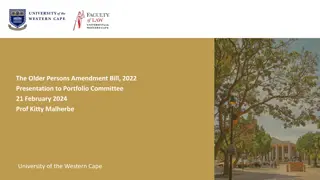
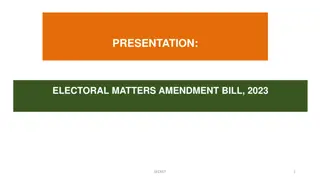



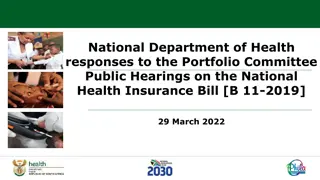



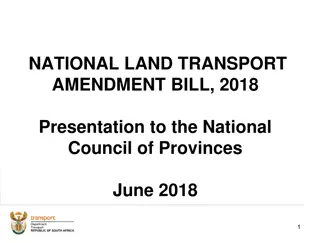



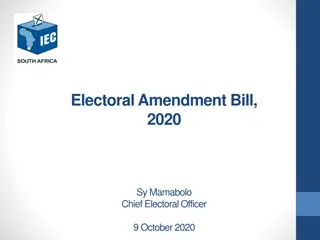

![Briefing on the Criminal Procedure Amendment Bill [B12-2021] to the Portfolio Committee on Justice and Correctional Services](/thumb/157093/briefing-on-the-criminal-procedure-amendment-bill-b12-2021-to-the-portfolio-committee-on-justice-and-correctional-services.jpg)
